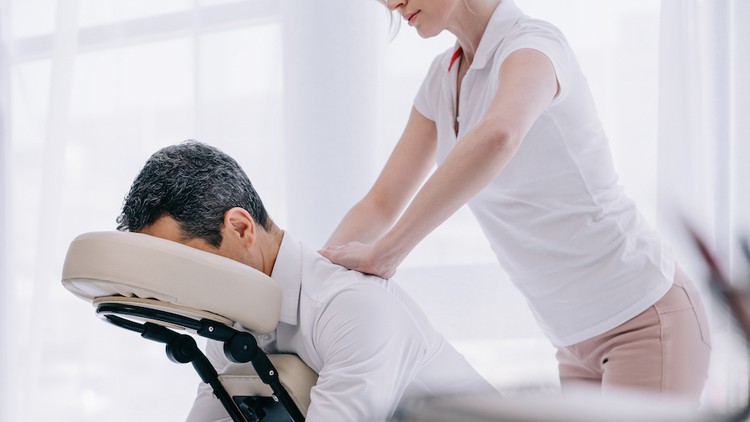
Online Chair Massage Therapy Course
What you will learn
1. CM Introduction
2. Chair massage business
3. Skeletal & muscular
4. Anatomy physiology of human body
5. Anatomy physiology
6. The lymphatic drainage system
7. Ethics contra consult
8. Massage consultation
9
10. What is a chair massage
11. Centre waterfall technique
12. Client relaxation cues
13. Alternate palm & fist
14. Spine walking
15. Cat trap & butterfly
16. Save your thumb technique
17. Side of hand massage
18. Neck massage technique
19. Double thumb technique
20. Chair massage at airport
21. Erector spinae
22. Lower back massage
23. Front cat technique
24. Lordosis,kyphosis & scoliosis
25. Front forearm
26. 5 minute massage
27. Neck & head massage
28. Neck shoulder tension
29. Chair arm massage
30. Thai chair massage style
31. Mobile chair massage
32. Elbow chair massage
33. Congrats
Description
Massage offers scientifically proven relief from stress and chronic pain. Used worldwide as an adjunct treatment for a wide range of health-related needs, millions of Americans receive massages, but so many more could benefit if only it were more accessible. The good news is, for clients who want a massage but can’t get away from home or work for the full table version, massage therapists are taking chair massage on the road, and it’s been a tremendous success.
How is a Chair Massage Performed?
A professional chair massage is performed with the same care and precautions as the full table version. Massage therapists ask clients about their goals and physical limitations. After a brief discussion, they’re seated face-forward in the chair, and adjustments are made for comfort.
Massaging generally begins with the large muscle groups in the upper back and radiates toward the lower back, shoulders, neck and arms. Because large muscle groups support the smaller muscles that are often the sites of pain, it’s an ideal technique. Massage therapists may recommend different types of massages based on a client’s physical responses, and what they believe would feel best.
While full-body table massages last from 30 minutes to an hour or more, most upper body chair massages require only 10–20 minutes, duration may vary based on need. When the massage is complete, the equipment is sanitized and prepared for the next client.
Benefits of Chair Massage
Adverse physical effects such as muscle tension, tissue binding, and muscular knotting can lead to headaches and joint discomfort. The damage, if left untreated, can cause long term effects. Prioritizing comfort and general health are a vital part of maintaining a high quality of life.
The chair massages is limited to the upper body, however the benefits are similar to full-body table versions and include stress reduction, enhanced circulation, increases physical flexibility, a more vibrant immune system, pain relief, deeper sleep, improved athletic performance, a brighter mood, and better chronic disease management.
What happens in a chair massage?
In a typical chair massage, you sit leaning forward into a massage chair with your face nestled in a plush face cradle while a therapist massages your neck, back, and arms. If you’re not already familiar with chair massage, chances are you’ve noticed its use in airports, conferences, or salons.
The idea of corporate chair massage is that you don’t have to leave the office to help your team take care of their minds and bodies.
The idea of corporate chair massage is that you don’t have to leave the office to help your team take care of their minds and bodies. There’s no special preparation or change of clothes required, and you enjoy the physical, mental, and emotional benefits of a massage without having to sneak out of the office for a spa day.
The Top 20 Benefits of Massage Chairs
1. Enhances Post-Workout Muscle Recovery
2. Reduces Anxiety and Stress
3. Helps in Inducing Better Sleep
4. Relieves the Pain From Sore Muscles
5. Offers a Good Treatment for Lower Back Pain
6. Decreases Stiff-Neck Problems
7. Simulates Chiropractic Maneuvers for Sciatica
8. Improves Blood Circulation
9. Increases Oxygen Flow to the Extremities
10. Flushes the Lymphatic System
11. Boosts the Natural Immunity of the Body
12. Decreases the Frequency and Severity of Headaches
13. Spruces Up Physicality and Intimacy
14. Improves Creativity and Problem-Solving Skills
15. Increases Workplace Harmony
16. Decreases Workplace Injuries
17. Boosts Employee Loyalty
18. Helps Executives in Staying Mentally Fit
19. Alleviates Stress-Related Health Problems
20. Gives an Energy Boost and Enhances General Wellness
Content